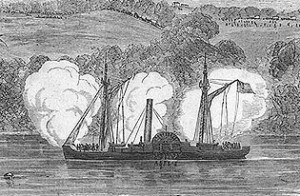I found this anecdote with some relevance to the 17th in Back “in war times.”: History of the 144th regiment, New York Volunteer Infantry, by James Harvey McKee, a history of the 144th N.Y.V. Infantry published in1903. The 144th served alongside the 17th in both South Carolina and Florida in 1864 (and probably a portion of 1865). A CDV album of the 144th NY that was auctioned off in 2008 contained an autographed CDV of Colonel Noble.
I’ve tried to determine the identities of the soldier-clerks of the 17th mentioned here – J. Wilkes Booth is most likely John W. Booth, Company D, of Monroe, Connecticut and Sergeant Smith is probably Sergeant Charles Smith, Company G, of Ridgefield, Connecticut. No promises that is 100% correct but it seems likely. The USS Mahaska, a wooden double-ended sidewheeler, was launched in 1861. The Mahaska took part in the joint expedition against Jacksonville, Florida in early 1864, remaining on picket and patrol duty in the St. Johns River until that August. That places the time of this incident between April and August 1864.
Here is the story of The Flying Dutchman of the 17th CT “navy”:
One thing which marked our stay in Florida was our frequent changes of camp. Our last move brought us to a very pleasant one on the bluffs overlooking the St. John’s River. The river furnished to the soldiers several luxuries of which they were not slow to avail themselves– opportunity to boat, to bathe and to fish. In bathing, the matter of “gators” had to be reckoned with and provided against. In boating, all kinds of craft were drafted into service and quite a variety of experiences resulted pleasurable and otherwise. The following extract which first appeared in the Freeman’s Journal of Cooperstown will illustrate one of these experiences. Phil Randall of Co. I was on duty as clerk with Capt. St. John, then Inspector-General on Gen. Birney’s staff. He with two other clerks, Sergt. Smith and J. Wilkes Booth, of the 17th Connecticut, on duty at the Adjutant General’s office, had formed acquaintance.
“A warm friendship sprang up between the clerks and when off duty they might be seen together sailing on the river in an old dug-out, or log canoe, which they had somewhere picked up and kept under lock and key for their own convenience. Phil R., in one of his rambles up the river discovered a deserted plantation, some three or four miles from Jacksonville and near the Confederate lines where fruit, melons and other vegetables grew in luxurious abundance. On his return he proposed to the other two clerks to make a raid on this plantation of fruitful delight even at the risk of being captured by the enemy.
A day was fixed upon and the dug-out was brought into requisition and in due time they arrived at the plantation when after a careful survey finding no enemy in sight they proceeded to load up with ripe watermelons, cherries and two or three bags of corn which was in fine condition to roast or boil. All went well on their return till they got near the city when an oar was broken which made further progress slow. Close by in the middle of the river lay at anchor the gunboat Mahaska. As they neared her they were challenged “Boat ahoy! What boat is that?” As the clerks had not thought of a name for their ill looking craft no response was given. Soon a second challenge came. They looked at each other and remained silent but as their eyes rested on the Mahaska they saw men getting a gun in position bearing upon them and as the third challenge came “Boat ahoy! What boat is that?” Sergt. Smith impulsively sprang to his feet and sang out “The Flying Dutchman.” Then came an order for the Flying Dutchman to come alongside which thev obeyed. A ladder was lowered and they went aboard where the officer in command asked if they had passes. They replied that they had not but had permission to go on the river. The officer then told them it was his duty to take them under guard to headquarters and ascertain if their statement was correct. A boat was lowered and a crew of twelve men and an officer manned it. Thus the three clerks were taken ashore in fine style, the Flying Dutchman being towed along. On landing they were taken to their quarters where the boat’s officer found everything all right and they were released and soon had the dugout’s load of luxuries at their tents and they enjoyed the same. Many a hearty laugh did the soldier clerks have over their quick naming of their old dugout.

